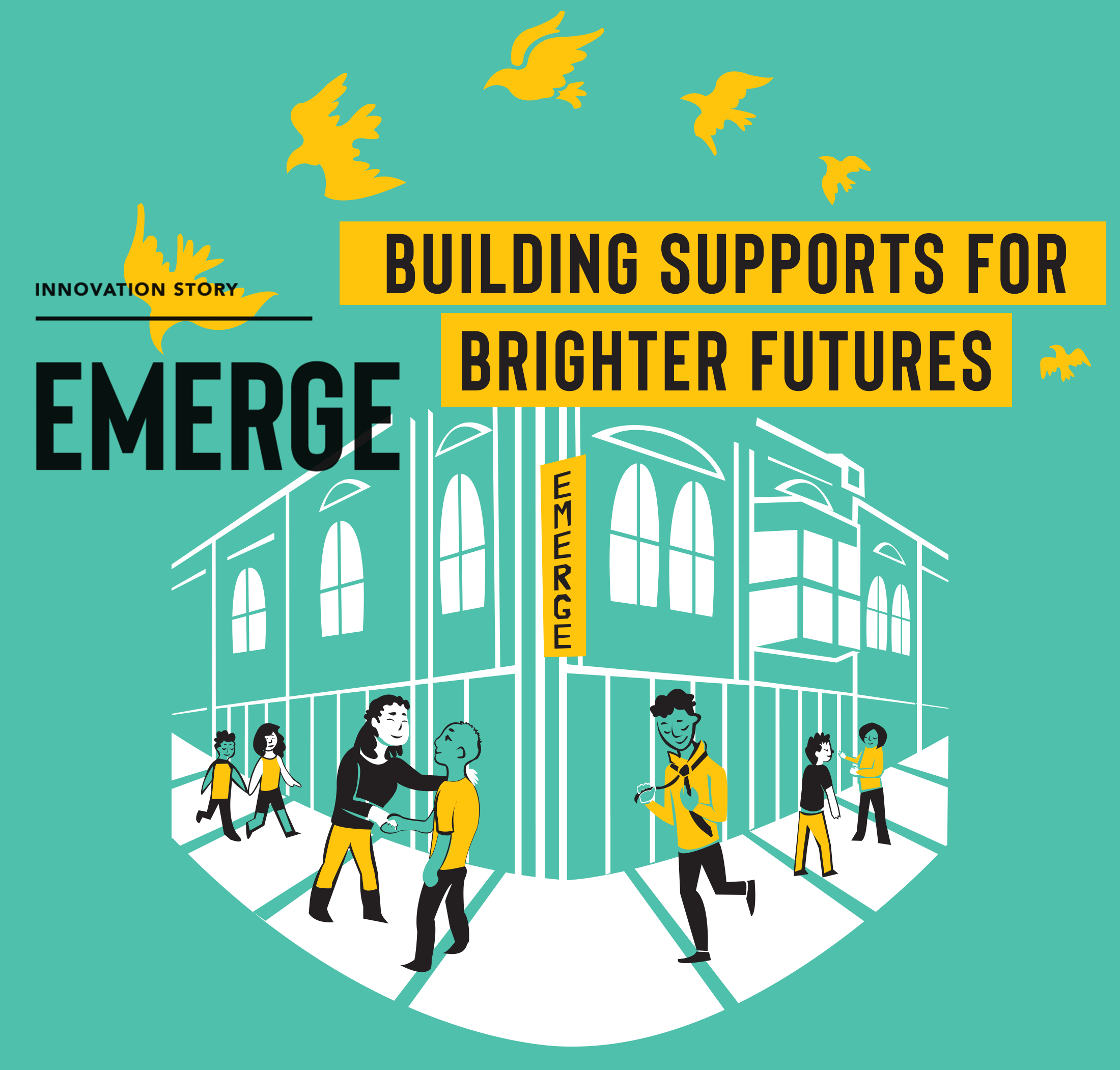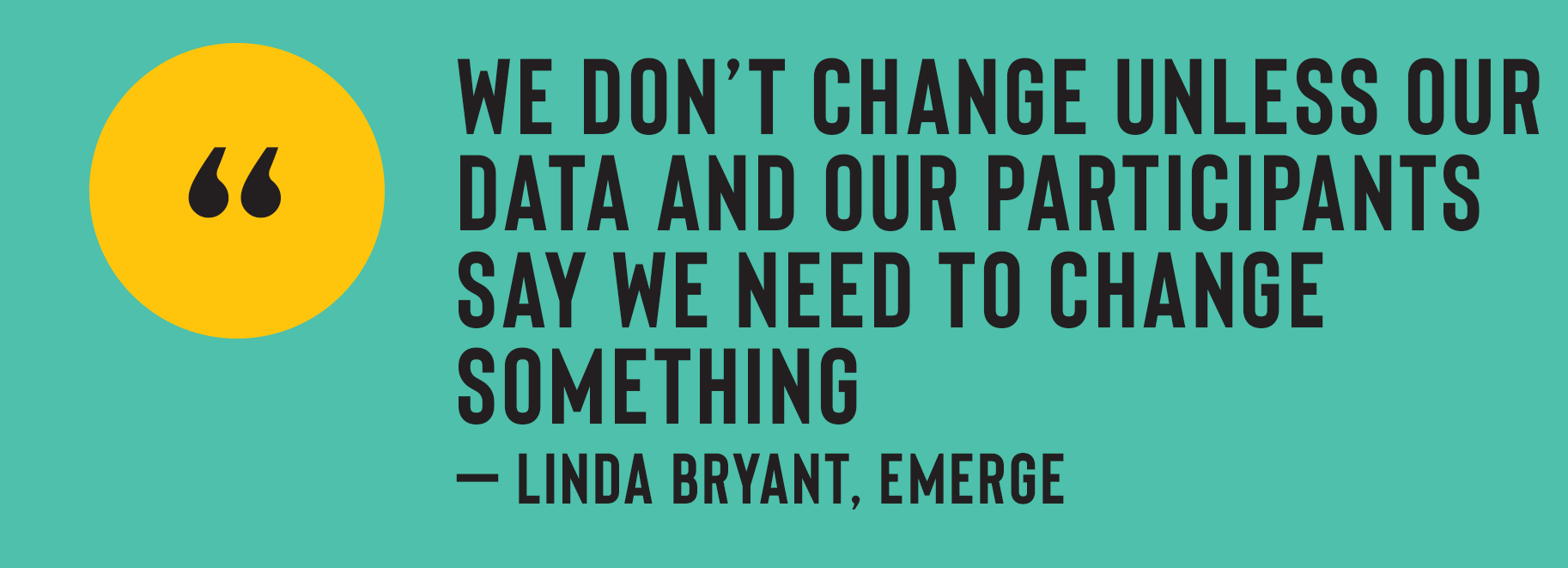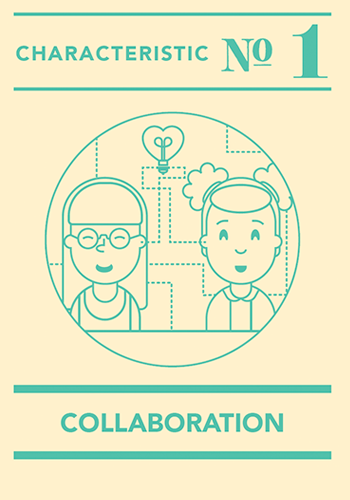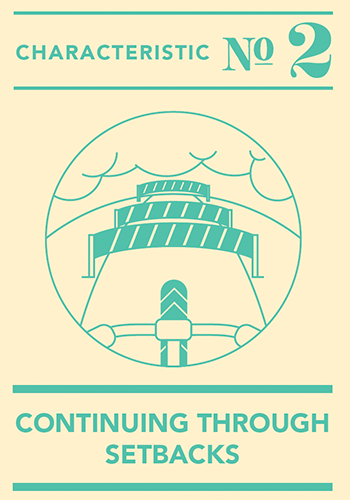
A story on Emerge’s Bush Prize for Community Innovation.
By Danielle Bylund and Morgan Mercer
This story was originally published in 2016 as part of recognizing EMERGE being named a winner of the Bush Prize for Community Innovation.
Jon Vang emerged from eight and a half years in prison with an idealistic vision: He wanted to go home, get a job, be a part of his community and change it for the better.

Each day he served his sentence, Jon spent time trying to prepare himself for the moment he stepped outside the prison walls. He learned how to fix computers. He practiced mechanical drafting. He facilitated conflict resolution workshops and took advantage of every educational opportunity he could find. Even with the work he put in, Jon knew it would be hard to find a job with his criminal background, but he didn’t realize it would seem nearly impossible.

His self-esteem dropped. Jon felt isolated, alone and like a drain on his family and society. A mentor recommended he reach out to EMERGE Community Development for help. Jon called the organization and left a message. One of the managers called him back and encouraged Jon to join The Job Club. There, Jon met other job hunters, connected with employees from staffing agencies and found the support he needed to continue his career hunt.
For the first time, Jon had a team of financial and job coaches around him. Staff listened, and it seemed like they understood him in ways other job programs hadn’t. With the people who worked at EMERGE, he felt a genuine connection—one that only deepened when he found out the organization often hired employees who had served time, just like him. In them, Jon saw hope for his own future.
“I believe in the possibilities of people,” says Mike Wynne, EMERGE president and CEO. “It’s important for our organization and our community to double down on the kind of place we want to create. It’s about better jobs, better lives and better communities.”

Now, as a supervisor at EMERGE, Jon is the one trying to hold the door open for other people looking for employment and a better future. He manages the training programs and a staff of five people who chat with incoming clients to figure out their needs and interests. John and his staff work with people coming out of prison, job seekers who have been laid off and young people who are struggling to find direction in their lives. For each person who walks through the doors, Jon sees them as he sees himself—someone who is trying to do better.
“I come here, I listen to them and I empathize with them,” he says. “Here at EMERGE, we’re all just ordinary people trying to do extraordinary things.” The payoff is evident when he gets to watch someone build up a new life from nothing, just like he once did.

In 2008, there was an upswing of homicides in North Minneapolis. In response, EMERGE did what few other organizations had the temerity to do. They hit the streets, and asked young men involved in the gang violence to share what they needed most to put a stop to the trend. Will Wallace, a coach with EMERGE, walked up and down the neighborhoods interviewing people about what the organization should do to help. The resounding answer? Jobs. In 2010, EMERGE launched the North 4 Project, a program that has matched 155 young men, living in the most crime-ridden neighborhoods in Minneapolis, with paid internships. Since the program began, more than 70 of them have transitioned into new careers despite criminal offenses.
The listening didn’t stop with Will. For years, EMERGE focused its efforts on expedited job placements. After a while, the organization saw a pattern develop: participants cycled through entry-level positions but were unable to sustain a higher standard of living. To remedy that, EMERGE shifted its attention to a new strategy. Rather than focus on short-term solutions that simply helped participants secure employment, EMERGE began transforming communities by giving job seekers real-world experience and training that would help them retain jobs, find careers and increase their incomes.
“We don’t change unless our data and our participants say we need to change something,” says Linda Bryant, who started volunteering in the social service sector when she was 14 and now works as the vice president of workforce training and mission services at EMERGE. “Even if [a program] isn’t working, a part of it is. We keep tweaking the things that aren’t as effective, and eventually we get closer and closer to success.”

Every quarter, EMERGE tracks and analyzes data it collects from nearly 400 employer partners. The organization also surveys participants about what works, what doesn’t and how EMERGE needs to improve. One of the most telling numbers that drives the nonprofit’s work is the average wage of the participants across its programs. With that information, EMERGE determines whether the wage is livable or not, and tweaks its programs in accordance. Ultimately, the goal is to see that number climb—even if just by a few pennies—each quarter.
In 2015, the organization renovated a historic building in North Minneapolis and turned it into a high-tech, state-of-the-art space for workforce development and career training. The EMERGE Career and Technology Center (ECTC) brings together a range of partners—such as community-based organizations and post-secondary institutions—to bring new hope to the community. After its first year, EMERGE saw an average wage increase from $10.98 to $13.05 an hour for clients who completed ECTC training.
What makes EMERGE so successful at lifting people out of poverty and other difficult situations is its ability to design human-centered solutions to meet participants wherever they are when they walk through the organization’s doors. At every roadblock to economic independence, EMERGE has a mechanism in place to break the barrier. When clients first sit down with an employment or training coach, they fill out an Individualized Employment Plan (IEP). In it, they lay out roadblocks preventing them from finding or holding down a job and write goals to address those challenges. When people need transportation to work, EMERGE provides a van service that gets second and third shift workers to suburban job sites that are hard to reach with public transportation. When youth don’t meet the requirements to qualify for support through other nonprofits, EMERGE steps in to fill the gap. When people need help covering their basic needs, EMERGE connects them to emergency housing services and gets its clients health care. If EMERGE doesn’t offer a service participants need, the nonprofit finds a partner organization that can.
“[We’re] problem solving around all the things that are going to come up,” says Mike, who offers clients up to 12 months of coaching and emergency support after their initial sessions. “It’s not just having a backup. It’s having a backup to the backup so that you don’t get derailed in the transition to employment.”

In 2014, Vince Frazier reached out to EMERGE. He needed to find a job and a way to support the three boys counting on him at home. At the time, he felt lost and lacked confidence. EMERGE matched him with a workforce coach, put him through work readiness training and helped him find a job working as a caterer. Five months later, Vince graduated to working as a recruitment specialist with EMERGE, eventually becoming a workforce coach. Just two years from his initial session, he was sitting in the exact same chair as the coach who had originally helped him.
EMERGE’s hiring practices facilitate a built-in authenticity with clients. About a fifth of its employees are former participants like Vince. For many of its roles, the team at EMERGE values life experience and “community credentials” over post-secondary degrees. The organization employs coaches and leaders who have reinvented themselves in the same way clients are expected to.
“We can tell people, ‘I see you, because within you I see myself, and I want to help,’” says Vince, who is now an instructor with EMERGE. “That’s what sets us apart. We see people for who they are and what they need, and we have a genuine investment in that.”
When EMERGE shifted its focus toward skills training and career placement, it required a different kind of support from staff who could build long-term relationships with program participants. Marcel Urman, a director at EMERGE, describes this loop as a kind of recycling system where the organization grabs the people with the talent and the drive to complete job training and go through the hard work of being coached to join the staff and guide a new generation. This method is particularly effective with clients coming from the prison system. Marcel, a former inmate, attends transitional fairs at Minnesota State Prisons where offenders with less than 18 months on their sentences mingle with organizations like EMERGE.
“I like to go because there are still some people who are incarcerated from when I was incarcerated,” says Marcel, who bounced in and out of prison for more than 10 years before going to EMERGE for the first time with his younger brother. “When they hear me talk about what I’ve done since [being released], it provides a certain level of inspiration and hope I don’t think they would have otherwise.”
Meeting employees at EMERGE who have traded the stigma associated with incarceration for a professional job puts a real face and a believable story behind the services EMERGE offers. While clients are incarcerated, EMERGE collaborates with corrections staff and social workers to provide onsite work readiness training, resumé assistance and goal setting. Upon release, participants are greeted at EMERGE’s North Minneapolis headquarters by the same job coach with whom they’ve already built a relationship. The organization places about 67 percent of these individuals in jobs or training post-release.
“It’s easy to look at behavior or circumstances and make judgments off that,” says Vince. “I made a decision to look past that, to look at the person and to see their worth and value. I let them know I see them. That goes a long way.”

Staff like Marcel and Vince reflect the communities EMERGE serves. They live and worship in the same places, come from the same cultures and speak the same languages. They’ve experienced the same barriers and have overcome the same challenges participants are striving to surmount. EMERGE is able to keep the pulse of the community because it’s a part of the community. Talking to a representative from EMERGE is as easy as saying “hi” to a neighbor, because EMERGE staff members are just that—they’re neighbors and leaders personally invested in the success of the community.


The EMERGE Career and Technology Center (ECTC) redefines the way community-based organizations, post-secondary institutions and public institutions come together to provide a centralized source of training for EMERGE participants. The ECTC has attracted two major onsite partners, including the Hennepin Technical College and Minnesota Computers for Schools. Through a unified recruitment process—and thanks to EMERGE’s reputation as a trusted partner in the community—the ECTC acts like an on-ramp to post-secondary education, providing access to people who need it most, but might not find it otherwise. “Education is a key to helping people figure out what they want to do and the things they want to achieve,” says Vince Frazier, an instructor at EMERGE.

EMERGE launched HIRE GROUND, a work readiness program that blends traditional job search topics with self-exploration. When EMERGE started, it stuck to a strict Monday-to-Friday schedule. However the organization found it wasn’t bringing in the number of people it hoped. In 2016, EMERGE transitioned to a rolling cohort model. Now, participants start the 10-day curriculum at any point in the week and rejoin the at any time if they miss a day. Experienced participants serve as resources for new ones. Clients are free to invite friends or family members to join them in class, too, without waiting for a new cycle. This maximizes social networks to increase EMERGE’s impact in the community. In its second year, participation in HIRE GROUND increased by 51 percent compared to previous rates under the traditional model.

After a recent merger with Momentum Enterprises, even a criminal background doesn’t pose the same challenge to employment that it used to. Through the union, EMERGE brought four new social enterprise businesses under its umbrella. Now, the organization is no longer just a service provider, but a job creator. The expansion means EMERGE can offer transitional employment opportunities to people not yet competitive in traditional markets due to criminal backgrounds or gaps in work history. These jobs give clients work experience, wages and networks of support that they can use as a springboard to their next opportunity. “It’s not just about getting somebody a job,” says Mike. “It’s about empowering a community to be economically stronger.”

Produced in partnership with the Bush Foundation
to showcase the culture of innovation
behind its Bush Prize winners.
Contributors





